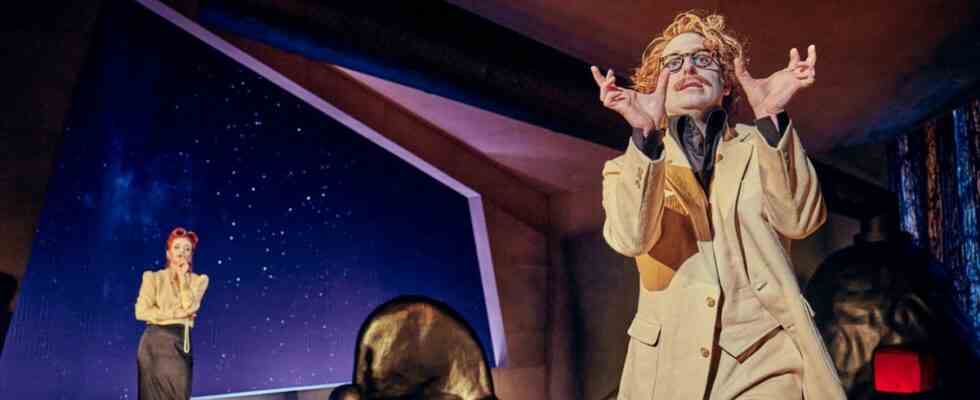Maybe it’s the wrong time for Herbert Fritsch’s humor. At the moment it just seems a little out of place, if not embarrassing, when an overexcited main actor makes fun of Grandpa’s stories from Stalingrad in a squeaky tone, while cities in the Ukraine are experiencing their “Stalingrad” at the hands of Russia’s troops. Even if his stage partner screams and laments about bleeding to death at the front, as if that were just the core anecdote of their marriage, which has become rigid in rituals, it doesn’t really want to be funny under the new political circumstances.
In 1974, in the late post-war period, when Thomas Bernhard wrote his “Jagdgesellschaft” and Claus Peymann premiered it at the Burgtheater, everyone in the audience probably understood these scenes between a family friend who wrote and a married couple as a mockery of the disgusting self-stylization of old Nazis. But when Herbert Fritsch stages this play in 2022 with his methodical obstetrics for the clown in man as grotesque chatter at the Deutsches Schauspielhaus in Hamburg, then unfortunately he only pulls the skin off the play.
Because his twisted humor of hysterical childishness, with which Fritsch has been mischievously driving out the adult seriousness of the theater for a good ten years, thrives on radically refusing any reference to the present. His wriggling, giggling, uninhibited and dopey comedians are always on the hunt for humor in a parallel universe devoid of moral admonitions.
In the resonant space of current fears and crises, the figures are unsuccessful caricatures
But suddenly this ultra-motley hunting party enters a new resonant space of fears, crises and omnipresent associations of violence, destruction and bitter seriousness. And in it, the cheerful fur hunters with Native American paintings, the characters from the Chinese opera and the aged Harry Potter villain in field uniform as Cosima Wanda Winter costumed the snowbound troupe of political schemers and animal-hunting friends all seem like botched caricatures.
Thomas Bernhard’s tough, nasty, insistent humor of patiently repeated hints, with which he describes the last episode of a political turnneck in a forest that has been completely eaten up by bark beetles, also seems to have the wrong translation for the gear wheel of Herbert Fritsch’s stage mechanics . The author’s pace of humor inevitably thwarts the director’s zeal for fun, and the result is a truly sluggish evening with the characters all treading water.
Michael Wittenborn as an inappropriately likeable general who constantly dies and rises again, Angelika Richter, who in her inflexible role as a stupid wife gets the only laugh when she tosses her pearl necklace around her neck, and the “writer” Bastian, who struggles with his never-ending virtuosity Unfortunately, Reiber can never get out of the trap that arises from the wedging of three incompatible hunting stories: Bernhard’s mendacious hunt, Fritsch’s humor baiting and Putin’s manhunt as the hard to avoid real background of a play that has the bigoted philosophy of a militaristic way of life as its subject. If the former professional comedian Volodymyr Zelensky were to deliver his war speeches in a Napoleon uniform and embellished with jokes, it could hardly seem more absurd.

